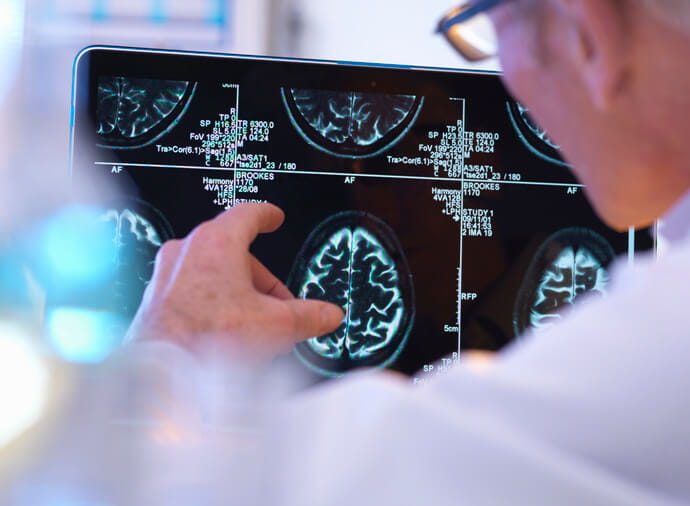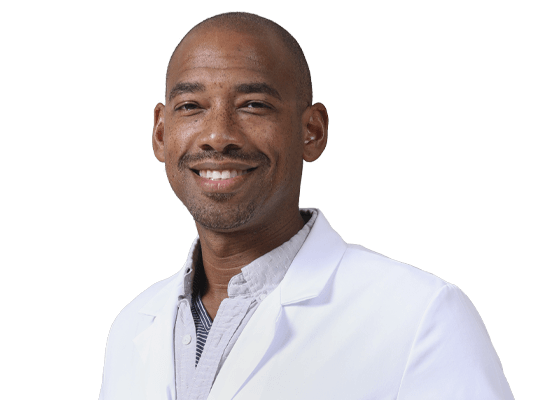Baptist Health Neurology
That Treats You Like Family
Get Started
Movement disorders are neurologic conditions that cause spasms, jerking, or shaking. These problems include increased movement that can be voluntary (intentional) or involuntary (unintended) and decreased or slow voluntary movement.
This movement disorder affects the cerebellum, the part of the brain that controls coordinated movement. Ataxia may cause uncoordinated or clumsy balance, speech, or limb movements, among other symptoms.
This condition causes long-lasting contractions or intermittent contractions of the neck muscles, causing the neck to turn in different ways.
This condition is characterized by repetitive, brief, irregular, somewhat rapid, involuntary movements that typically involve the face, mouth, torso, and limbs.
Dystonia involves sustained involuntary muscle contractions with twisting, repetitive movements. This condition may affect the entire body (generalized dystonia) or one part of the body (focal dystonia).
This condition isn’t due to neurological disease, but it can resemble any of the movement disorders.
Huntington’s disease is an inherited progressive, neurodegenerative disorder that causes uncontrolled movements, impaired cognitive abilities, and psychiatric conditions.
Multiple system atrophy is an uncommon, progressive neurological disorder that affects many brain systems. It causes a movement disorder, such as ataxia or parkinsonism. Multiple system atrophy can also cause low blood pressure and impaired bladder function.
This condition causes lightning-quick jerks of a muscle or a group of muscles.
This slowly progressive, neurodegenerative disorder causes tremor, stiffness, slow decreased movement (bradykinesia), or imbalance. It may also cause other non-movement symptoms.
Parkinsonism describes a group of conditions with symptoms that are similar to those of Parkinson’s disease.
This is a rare neurological disorder that causes problems with walking, balance, and eye movements. It can resemble Parkinson’s but is a distant condition.
This movement disorder causes unpleasant, abnormal feelings in the legs while relaxing or lying down. Restless legs syndrome can often be relieved with movement.
This neurological condition is caused by long-term use of neuroleptic drugs used to treat psychiatric conditions. Tardive dyskinesia causes repetitive and involuntary movements, such as grimacing, blinking, and other movements.
Tourette syndrome starts between childhood and teenage years and is characterized by repetitive movements (motor tics) and vocal sounds (vocal tics).
This movement disorder causes involuntary rhythmic shaking of parts of the body, including hands, head, or other parts.
This a rare, inherited disorder that causes excessive amounts of copper to build up in the body, causing neurological problems.

Symptoms: Stumbling gait, difficulty with fine motor activities, vision, and speech problems.
Treatment: Medications including L-DOPA, anticholinergics, dopamine agonists amantadine, selegiline, and entacapone.
Symptoms: Muscle contractions that cause your head to twist in a variety of directions.
Treatment: Since there isn’t a cure, treatment includes relieving the signs and symptoms.
Symptoms: Random, brief, non-rhythmic involuntary movements.
Treatment: Treating the underlying cause of the movements, discontinuing certain medications, and prescribing medications that can help suppress the movements.
Symptoms: Involuntary muscle spasms that can affect any part of the body.
Treatment: Three-tiered treatment approach that includes Botox® injections, medication, and surgery.
Symptoms: Tremor, jerks/twitches, spasms/contractions, walking problems.
Treatment: Physical therapy, cognitive behavioral therapy, medication, hypnosis, neurobehavioral clinic referral.
Symptoms: Jerking, twitching, uncontrollable movements of the limbs, torso, and face. Progressive loss of mental abilities.
Treatment: Focus is on reducing symptoms, preventing complications, and helping family members cope with the condition. Doctors may also prescribe antipsychotics, antidepressants, tranquilizers, mood stabilizers, and Botox injections.
Symptoms: Stiffness or rigidity, freezing or slowed movements, instability, fall in blood pressure when standing, which can cause dizziness, fainting, or blurred vision.
Treatment: Medications to treat slowness and rigidity and medications to help raise blood pressure.
Symptoms: Jerky, rhythmic movements that can affect a muscle or a group of muscles.
Treatment: Medications that help reduce the symptoms, sometimes combining multiple drugs, including barbiturates, phenytoin, primidone, and clonazepam.
Symptoms: Tremor, stiffness, slow decreased movement (bradykinesia), or imbalance. It may also cause other non-movement symptoms.
Treatment: Medications to relieve the symptoms of the disease. Medications include dopamine precursors, dopamine agonists, and anticholinergics.
Symptoms: Tremor, rigidity, gradual loss of spontaneous movement, decreased mental skills, posture difficulties.
Treatment: Many of the medications used to treat this condition come with side effects, so work with your doctor on medication management. This condition doesn’t seem to respond to medical therapy as Parkinson’s does.
Symptoms: Problems with walking, balance, and eye movements. It can resemble Parkinson’s but is a distant condition.
Treatment: Treatment for this condition is symptomatic and supportive. In some cases, drugs used to treat Parkinson’s can offer limited and temporary relief.
Symptoms: Unpleasant, abnormal feelings in the legs while relaxing or lying down. Strong urge to move your legs.
Treatment: Treating underlying conditions, like iron deficiency, under the supervision of your doctor. Medications that increase dopamine in the brain, opioids, muscle relaxants, and sleep medications.
Symptoms: Repetitive and involuntary movements, such as grimacing, blinking, lip-smacking, and other movements.
Treatment: There currently isn’t a treatment for tardive dyskinesia, but the risk of developing it can be minimized with certain antipsychotic medications.
Symptoms: Tourette syndrome is characterized by repetitive movements (motor tics) and vocal sounds (vocal tics). Vocalization usually occurs with the movements and can include throat clearing, shouting, barking, and the use of obscene words.
Treatment: Medications can be used, but many have serious side effects. These medications are typically prescribed in their lowest dose effective dosage.
Symptoms: Involuntary rhythmic shaking of parts the body, including hands, arms, head, or other parts of the body.
Treatment: Medications can reduce tremors in about 50-75% of patients. Physical therapy and changes in lifestyle can improve symptoms as well. If the tremor is so severe that it causes a disability, surgery may be recommended.
Symptoms: Jaundice, abdominal swelling, vomiting of blood, abdominal pain, tremor, and difficulty walking, talking, or swallowing.
Treatment: Early diagnosis is critical due to the liver damage that can occur with copper build-up. Treatment involves removing excess copper from the body and preventing it from reaccumulating.
If you’d like to learn more about movement disorders, contact the Baptist Health Neuroscience and Stroke team today. If this is a medical emergency, please dial 911.